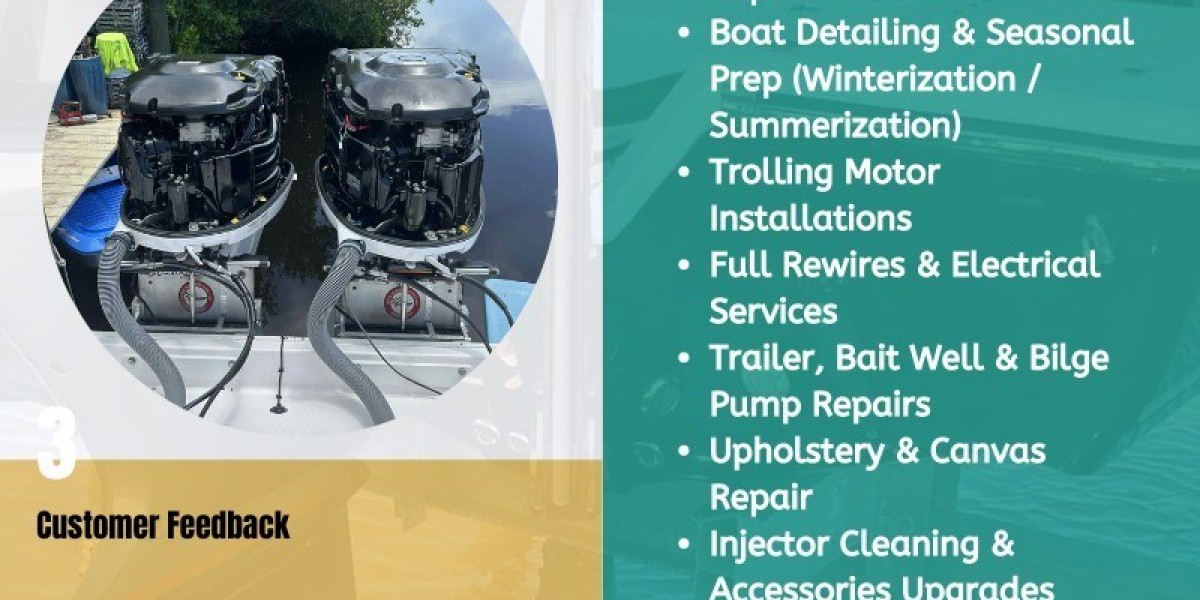Owning a boat in Fort Myers opens up a world of sunshine, fishing, and exploration across the Caloosahatchee River, Sanibel Sound, and the Gulf of Mexico. But even the most beautiful boating days can turn stressful if you’re not familiar with basic maintenance.
Saltwater, humidity, and Florida heat all take their toll on marine engines and hulls. Without proper care, corrosion, leaks, and mechanical issues can quickly develop.
This Fort Myers boat repair guide walks beginners through essential maintenance and repair basics — from engine upkeep to fiberglass care — using practical insights gathered from professional marine repair technicians across Southwest Florida.
Why Boat Maintenance Is Crucial in Fort Myers
Boats in coastal Florida endure harsher conditions than most inland vessels. Saltwater accelerates corrosion, barnacles collect on hulls, and UV rays damage gelcoat finishes. Over time, these elements can shorten a boat’s lifespan and increase the risk of costly repairs.
Routine maintenance ensures reliability, safety, and performance. It’s also the most cost-effective way to avoid major mechanical failures. Many local boaters rely on certified marine technicians who understand these regional challenges and can identify issues early.
A professional marine repair business with certified Marine Technicians not only fixes problems but also educates owners on preventive care — helping them enjoy smoother, more dependable boating seasons year after year.
Understanding Your Boat’s Engine
Your boat’s engine is its most critical system, whether it’s an inboard, outboard, or diesel configuration. New boaters often underestimate how much attention these engines need.
Key Engine Components to Know
Fuel system: includes filters, tanks, and lines — vulnerable to ethanol damage in Florida’s humid climate.
Cooling system: circulates water to prevent overheating. Blockages from salt or debris are common.
Ignition system: spark plugs, coils, and wiring keep combustion running smoothly.
Lubrication system: regular oil changes prevent internal wear and rust.
Technicians across Fort Myers stress that most breakdowns are avoidable with periodic oil checks, fuel filter replacements, and cooling system flushes after each saltwater trip.
Many local specialists are trained and specialized in the service of Mercury and Yamaha engines, as these brands dominate the region’s boating market. Understanding how your specific engine type works helps you spot issues before they escalate.
Routine Engine Care for New Boaters
For beginners, a simple maintenance routine can go a long way in preventing mechanical problems.
Inspect oil and coolant levels before every outing. Cloudy oil or low coolant signals trouble.
Flush the engine after every saltwater trip. This prevents internal corrosion from residual salt.
Replace spark plugs and fuel filters annually. Dirty filters restrict fuel flow and affect performance.
Listen for unusual vibrations or knocking sounds. These can indicate loose mounts or damaged propellers.
A well-maintained outboard or inboard motor delivers better fuel efficiency, smoother starts, and fewer breakdowns.
Fuel System Problems Common in Fort Myers
Ethanol-blended fuels absorb moisture from the air, creating condensation in tanks and leading to phase separation. Water in the fuel causes poor combustion, engine sputtering, or total failure.
To prevent fuel issues:
Keep tanks full to reduce condensation.
Add marine-grade stabilizers before storage.
Replace fuel filters frequently.
Drain old fuel after long idle periods.
Technicians emphasize that these small steps save boat owners hundreds in repair costs each year.
Electrical Systems: Powering More Than Just Lights
Electrical systems in boats operate under constant moisture and vibration. Corrosion and loose wiring are common sources of trouble.
Tips for Electrical Safety
Inspect battery terminals regularly and clean corrosion with baking soda solution.
Check fuses and circuit breakers before assuming a system failure.
Keep spare fuses and connectors onboard.
Protect wiring with dielectric grease to prevent oxidation.
If lights flicker or gauges stop working, check power distribution first. Electrical issues can often be traced to a single loose connection.
Hull and Fiberglass: The Foundation of Safety
Your hull isn’t just the exterior — it’s the structure that keeps your boat afloat. In Southwest Florida’s shallow, shell-filled waters, minor scrapes and dings are inevitable. Over time, they can let water seep into the fiberglass layers.
Hull Care Basics:
Inspect the bottom monthly for cracks or blisters.
Wash and wax the hull regularly to guard against UV and salt damage.
Touch up scratches immediately with matching gelcoat.
Avoid beaching your boat on coarse sand, which erodes protective coatings.
Routine cleaning and waxing protect not only the boat’s look but also its long-term integrity.
Dealing with Fiberglass Damage
Small gelcoat cracks are cosmetic, but deeper damage can compromise structural strength. Fiberglass repair requires sanding, resin layering, and color-matching — tasks best learned through experience or handled by qualified professionals.
Beginners should start with simple patch kits for cosmetic repairs and consult specialists for large cracks, delamination, or hull impact damage. In Fort Myers, fiberglass repair is one of the most requested services, largely due to dock bumps and trailer mishaps.
The Role of Bilge and Pumps
The bilge system is your boat’s defense against flooding. A failing pump can turn a minor leak into an emergency.
Regular Bilge Care
Test the automatic float switch monthly.
Clean debris and oil from the bilge area.
Check hoses for cracks or loosened clamps.
Keep spare impellers and fuses onboard.
A working bilge system ensures water is removed efficiently, protecting wiring, engines, and onboard equipment from damage.
Trailer and Transport Maintenance
Many Fort Myers owners trailer their boats between marinas and ramps. Maintaining the trailer is just as important as the vessel itself.
Grease wheel bearings every few months.
Check tires for wear and correct pressure.
Inspect brake lights and wiring before each trip.
Rinse the trailer thoroughly after saltwater exposure.
A neglected trailer can easily cause breakdowns on the road or damage your hull during loading.

Seasonal Boat Care in Southwest Florida
Unlike northern states, boating in Fort Myers is year-round — but there are still maintenance cycles to follow.
Spring: Inspect batteries, filters, and hull before heavy use.
Summer: Focus on cooling systems and electrical checks.
Fall: Clean and wax thoroughly before lighter use.
Winter: Perform full system checks and apply anti-corrosion sprays.
Even without freezing temperatures, seasonal maintenance ensures reliability and longevity.
Signs It’s Time for Professional Help
While many small tasks are beginner-friendly, some repairs require trained technicians. Seek professional evaluation if you notice:
Persistent overheating
Fuel leaks or fuel smell
Electrical shorts or tripped breakers
Structural hull damage
Steering resistance or hydraulic fluid loss
Certified marine technicians have diagnostic equipment that detects subtle faults quickly and safely.
Working With Certified Marine Technicians
Certified technicians bring formal training and brand-specific knowledge that general mechanics often lack. Their expertise covers complex electrical systems, gear cases, and electronic diagnostics.
A professional marine repair business with certified Marine Technicians ensures that parts, fluids, and methods meet manufacturer standards. Many technicians in Fort Myers are specialized in the service of Mercury and Yamaha engines, reflecting their popularity among local boaters.
For new owners, learning from these professionals builds long-term confidence in caring for their vessels.
Common Mistakes New Boaters Make
Skipping engine flushes after saltwater use — leading to corrosion.
Ignoring small gelcoat cracks — allowing water intrusion.
Using household cleaning products — damaging finishes and seals.
Overlooking trailer maintenance — resulting in roadside failures.
Delaying annual inspections — missing early warning signs.
Avoiding these pitfalls keeps maintenance simple and costs predictable.
Building a Maintenance Routine
Consistency is key. A simple checklist keeps you organized and proactive.
Monthly
Inspect fuel, oil, and cooling systems.
Test bilge pumps and lights.
Rinse hull and engine after use.
Quarterly
Replace filters and anodes.
Lubricate moving parts and hinges.
Inspect trailer bearings.
Annually
Schedule full engine diagnostics.
Polish and wax the entire hull.
Replace worn gaskets or belts.
Keeping a maintenance log helps track what’s been done — and prevents oversights.
Boating Safety and Preparedness
A well-maintained boat is a safer boat. Always carry:
Life jackets for every passenger
Fire extinguisher and first-aid kit
Navigation lights and distress signals
Spare propeller hardware and tools
Charged communication devices
Fort Myers’ waters are busy, and quick access to safety gear matters just as much as good mechanics.
Final Thoughts: Confidence Comes With Care
For new boaters in Fort Myers, learning maintenance is an empowering step toward independence and safety on the water. From routine oil changes to understanding your hull’s condition, every bit of knowledge helps you prevent problems before they occur.
While certified technicians remain essential for complex repairs, most owners can handle the basics with time and attention. Consistent care, record-keeping, and respect for Florida’s challenging marine environment will keep your vessel performing at its best — and ensure years of worry-free boating across Southwest Florida.








